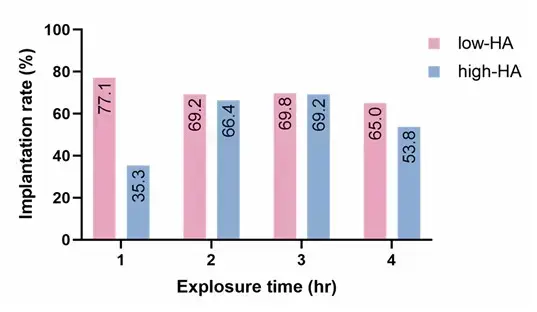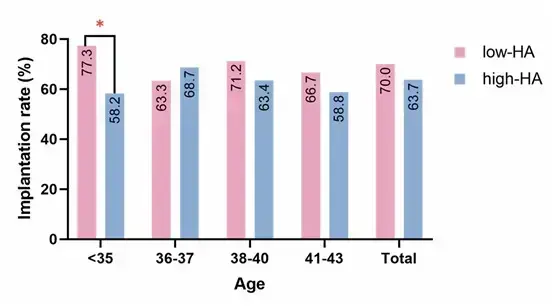
Academic Achievement
- Home
- About
- Academic Achievement
- 2023 Academic Publications
- Rethinking Hyaluronic Acid Concentration in Embryo Transfer Media and Its Impact on Implantation Rates
Rethinking Hyaluronic Acid Concentration in Embryo Transfer Media and Its Impact on Implantation Rates
Share
Presented by NUWA Fertility at the 2023 Taiwan Society for Reproductive Medicine (TSRM)


At the 2023 TSRM annual meeting, NUWA Fertility presented an oral research study investigating the relationship between hyaluronic acid (HA) concentration in embryo transfer media and implantation rates during frozen embryo transfer (FET) cycles. The study challenges the long-held assumption that higher concentrations of HA significantly improve implantation outcomes.
Background: The Role of Hyaluronic Acid in Embryo Implantation
Hyaluronic acid (HA) is commonly added to embryo transfer media due to its viscosity-enhancing and cell-adhesion-promoting properties, which are thought to facilitate better interaction between the embryo and the endometrium, potentially improving implantation success.

However, existing research remains inconclusive regarding the optimal HA concentration. This study aimed to determine whether varying concentrations of HA in transfer media have a significant impact on implantation rates in frozen embryo transfer cycles.
Key Insight: Higher HA concentration in transfer media does not necessarily correlate with improved implantation outcomes.
Study Findings: No Significant Correlation Between HA Concentration and Implantation Rate
The research team analyzed FET cycles using transfer media with different HA concentrations.
Results showed no significant difference in implantation rates between groups using low versus high concentrations of HA. This suggests that simply increasing the HA content in transfer media may not effectively enhance implantation success for frozen embryos.

Further Analysis: The Role of Post-Thaw Culture Duration
The study also examined whether the length of post-thaw embryo culture time influenced implantation outcomes.
In the low-HA group, extending culture time did not significantly improve implantation rates.
In the high-HA group, a slight trend toward higher implantation rates was observed with extended culture time—but this trend did not reach statistical significance and requires further validation in larger studies.
Clinical Implications: A More Balanced Perspective on HA Use in Embryo Transfer
These findings encourage both clinicians and patients to adopt a more evidence-based and cautious approach to the use of HA in embryo transfer media.
Pursuing higher HA concentrations alone may not be the key factor in improving frozen embryo implantation outcomes.
Future studies are needed to better understand the biological mechanisms of HA in implantation, explore potential individual patient differences, and establish evidence-based guidelines to guide clinical practice in embryo transfer preparation.
NUWA Fertility remains dedicated to advancing embryo transfer technologies and optimizing IVF outcomes.
By grounding clinical decisions in rigorous scientific research, we aim to provide patients with the most effective, individualized fertility care possible.
Seminars

